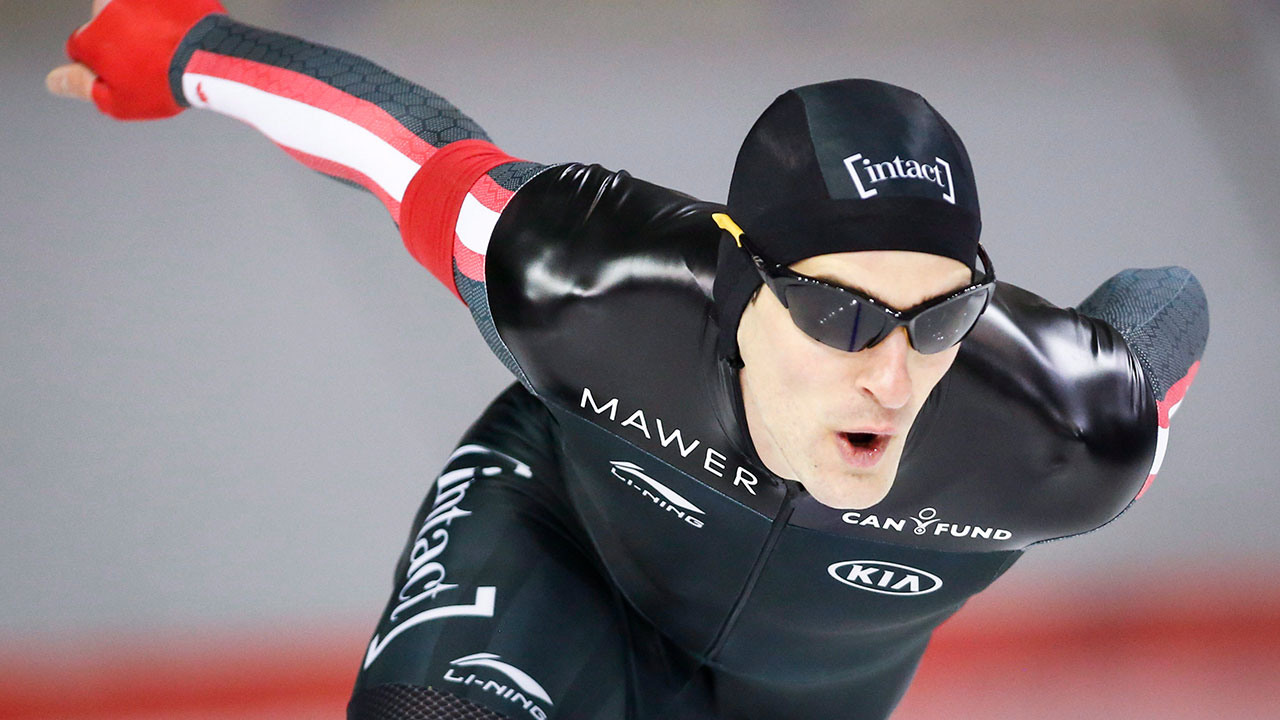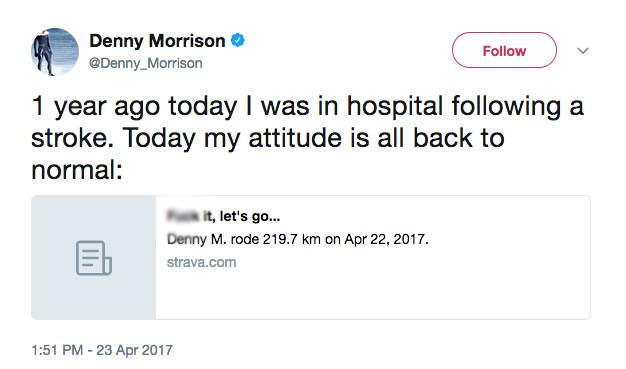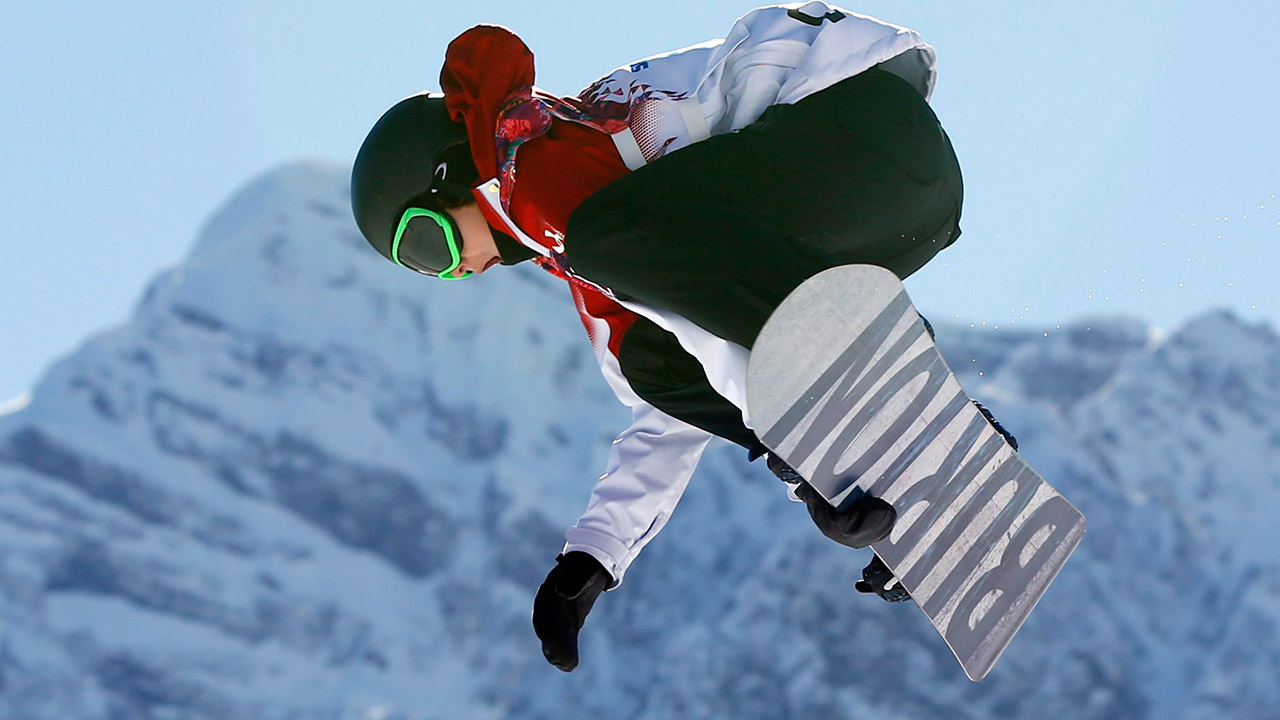PYEONGCHANG, South Korea – In his first moments of consciousness following the May 7, 2015 motorcycle accident that nearly killed him, Denny Morrison had a case of the hiccups.
That should have been the least of his concerns given that he also broke his right femur, punctured a lung, tore the anterior cruciate ligament in his knee, bruised his liver and kidneys and fractured a small bone near his spine when his bike struck a turning car in a Calgary intersection.
But each little hiccup, triggered by an allergic reaction to the morphine that was supposed to offer relief, instead reverberated throughout his shattered body, pain rattling every shredded bit of him. The 10 or so seconds between hiccups barely provided time to recover from the last and brace for the next.
“That’s the moment I look to for inspiration,” Morrison says now, “because that moment didn’t break me.”
Time and again en route to Pyeongchang for his fourth Olympics, the four-time long-track speedskating medallist from Fort St. John, B.C., has needed to draw upon his “very hardest moment,” doing what he describes as “a reverse meditation.” A stroke he suffered April 23, 2016 while mountain biking in Utah not only derailed his comeback, but threatened to take his life if not for the quick thinking of his wife Josie, a fellow Olympic speedskater.
Really, the 32-year-old is lucky to be alive, let alone competing among the world’s best athletes, something that also goes for snowboarder Mark McMorris. A bronze medallist at the 2014 Games when slopestyle debuted at the Olympics, overcoming a broken rib suffered two weeks earlier, the Regina native broke his right femur in February 2016 when he landed on an uneven patch of snow at a big air event in Los Angeles.
Sidelined for eight months, he recovered to enjoy a strong 2016-17 but on March 25, 2017, while snowboarding in the B.C. backcountry, he caught an edge on some soft snow, drifted too far and spun into a tree. The impact broke his jaw and his left arm, fractured his pelvis and ribs, ruptured his spleen and collapsed his left lung, requiring two surgeries to repair the damage.
Apparently a lot can change in a week.. So so thankful to have my life! It was touch and go there for a second and I don’t know how I can thank everyone enough for praying and sending healing vibes…. I hit a tree in the whistler backcountry a week ago and to be honest I was pretty sure I was going to die… @craigmcmorris @torsteinhorgmo @erinhogue @brandonkelly and @ryantiene saved my life by staying calm, building me a nest, and calling search and rescue I will never take another day on this earth for granted .. Much Love
117.3k Likes, 3,883 Comments – Mark McMorris (@markmcmorris) on Instagram: “Apparently a lot can change in a week.. So so thankful to have my life! It was touch and go there…”
Yet in 10 months, the 24-year-old has gone from fighting for his life to arriving at a second Games once again a medal contender.
“I thought I was going to die,” says McMorris. “Crazy ride. Don’t know if I’d change it.”
“My spirit won’t be broken”

In the wake of McMorris’s first injury, Morrison decided to write his fellow Olympian an open letter to offer up some advice on the rehab process he was about to face.
He ended the note by writing, “Good luck Mark, and see you in Pyeongchang,” with no way of knowing how much more difficulties both would face to reach South Korea.
“It’s a weird parallel story,” says Morrison. “I wrote the letter to Mark and before the motorcycle crash, I’d given keynote speeches to corporations and talked to schools about the importance of overcoming adversity and persevering through difficulties and then I’m faced with having to do all those things that I talked so valiantly about doing. It was time to put my money where my mouth is, it’s time to walk the talk.
“I felt I’d be doing a disservice to those people I’ve given many of those speeches to, a disservice to Mark if I didn’t make that comeback and a disservice to myself if I didn’t follow all those words I’d spoken.”
The first rehab was excruciating, demanding one thing Morrison has little of – patience. Speed Skating Canada physiotherapist Jenny Delich put him through the paces but containing his aggressive mindset and desire to push through pain was challenging.
So too was not getting instant results and trusting in the process. Doubt set in.
“There was no certainty that even if I did get strong enough that I was even going to make the Olympic team,” he says.
Then came the stroke, when Josie had to convince him to go to a hospital and get himself checked out when she worried Morrison was experiencing stroke symptoms.
“Perhaps when I was having the stroke there was some analogy of me not listening to Josie at first because I was older, ‘I have more experience with this, I’m not having a stroke, I’m not going to the hospital,’” he says. “Eventually she convinced me to go and saved my life. She got me there in record time and the impacts of that stroke were mitigated to as mild a form as possible under the circumstances.”
Initially unsure what the stroke might mean for his chances of reaching the Olympics, Morrison was cautious at first in his rehab and training, but as he became stronger his bull-in-a-china-shop mentality returned and he kept wanting to push the envelope. At the beginning of 2017, his frustration was encapsulated when he said to Postmedia’s Vicki Hall, “It’s a victory just to be alive, right? But it’s not a victory to be alive if I’m not living.”
On the one-year anniversary of his stroke, he sent out this tweet:

“It was like, ‘You know what? Let’s do the mountains and see how far we can make it in one day,’” says Morrison. “That was the attitude. Let’s go. There’s no more waiting around. It’s now or never. There were only nine or 10 months to the Olympics and I needed to start training and focusing on what I can.”
Buoyed by the bike ride, Morrison kept pushing and pushing, eventually making the long-track team again. In December he helped Canada win team pursuit gold at the World Cup in Salt Lake City and placed fifth in the 1,500 metres, the event he won bronze in at the Sochi Games.
And when he needs it, he thinks back to the hospital bed hiccups.
“Every once in a while my knee still isn’t the strongest because of the ACL injury that happened during the motorcycle crash has never been repaired,” says Morrison. “It’s not so much that those knee shakes and those setbacks have been the most painful thing, but mentally, they’ve been a huge struggle because it’s almost like the world is telling me you can’t do this, you’re not going to make it, I’m not going to let you. And just comparing that, that level of pain, that level of mental discomfort to that moment in the hospital bed, that never broke me then, this won’t break my spirit.
“Everything in my body can be broken but my spirit won’t be broken.”
“It might not be as easy but there’s a chance and that’s all I needed”

On March 31, 2017, McMorris tweeted about his crash, calling the previous week the hardest of his life and apologizing for his social media silence.
“I almost died and now I’m trying to get better,” he wrote.
Four days later, he sent out this:
Thank you for the support through this….. It's been felt deeply.
Thankful for the fact that I'm going to ride again… pic.twitter.com/4tXOmN2j4X— Mark McMorris (@markmcmorris) April 3, 2017
“I was in the induced coma for a few days and when I woke up my head physio [Damien Moroney] was there and he said, ‘If you put in the time we can make a full recovery and you’ll be able to snowboard again, and at the level you did before,’” says McMorris. “That was the best news upon waking up with being in the worst-case scenario, it was the best news that I didn’t have any permanent damage. Everything was fixable.
“It might not be as easy but there’s a chance and that’s all I needed to here to push through everything.”
McMorris detailed his recovery on Twitter, with pool work on the first day of his rehabilitation April 13, a skateboard ride May 17, squats with a medicine ball on May 25, a first flat-ground back flip on Aug. 1.
On Aug. 16 he was back snowboarding again. In November, he won in his first World Cup event back, claiming big air gold in Norway.
“You get better and you do everything you want in the gym and can pretty much do all the tricks but then you don’t know if you can compete,” he says. “That was definitely one of those moments that no words can describe. It was the happiest moment of the whole recovery, I think. Just battling through it all, first event back, winning and doing some pretty hard tricks in a pretty hard field of riders was pretty cool.”
Still, the series of injuries have taken a toll.
“It’s a little bit harder to warm up and in the morning I get a bit more stiff, things like that, but I have a lot of metal in my body now, I broke a lot of vertebrae in my back, my ribs, I have a little less of my spleen,” says McMorris. “Random little things that make me a little more old feeling than I should be at 24.”
That’s forced him to become smarter.
McMorris picks his spots more now, cognizant that he needs to manage his body. For instance, rather than going all out through a practice session, he focuses more on what he needs to do in preparation for competition.
“I feel like mentally it’s a little bit harder but I still feel like the same snowboarder, for sure,” he says. “The road I’ve been on is pretty bumpy and long. It feels good to be in a position where I can just focus on my snowboarding. Last March I definitely didn’t think this would be in the cards.”
[relatedlinks]
Life after near-death
There are new perspectives for both Morrison and McMorris at these Games after their near-death experiences, changed mentally as much as physically by their injuries.
“My gratitude and joy in my heart at being part of this team is something special, it’s almost more joy than I had at my first Olympics,” says Morrison. “Now I understand how much goes into it, not just from me, but also from those physios who were there with me early on doing exercises, forcing me to do the things we had to do.”
Adds McMorris: “I’m not really stressing too much over anything, you know? It could be so much worse. Happy to be alive and snowboarding, hanging out with my friends. I almost died. That was too serious. Everything else needs to be treated for fun.”










